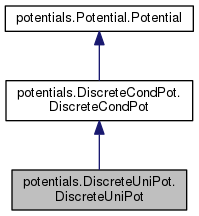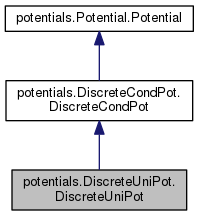 |
Quantum Fog
0.9.3
|
 |
Quantum Fog
0.9.3
|


Public Member Functions | |
| def | __init__ (self, is_quantum, node, pot_arr=None, bias=1) |
| def | size (self) |
| def | sample (self) |
| def | get_probs_from_amps (self) |
| def | __deepcopy__ (self, memo) |
 Public Member Functions inherited from potentials.DiscreteCondPot.DiscreteCondPot Public Member Functions inherited from potentials.DiscreteCondPot.DiscreteCondPot | |
| def | __init__ (self, is_quantum, ord_nodes, pot_arr=None, bias=1) |
| def | get_probs_from_amps (self) |
| def | normalize_self (self, postpone=False) |
| def | get_total_probs (self, brief=False) |
| def | __deepcopy__ (self, memo) |
 Public Member Functions inherited from potentials.Potential.Potential Public Member Functions inherited from potentials.Potential.Potential | |
| def | __init__ (self, is_quantum, ord_nodes, pot_arr=None, bias=1) |
| def | set_pot_arr_to (self, val) |
| def | set_pot_arr_to_one (self) |
| def | mask_self (self) |
| def | get_new_marginal (self, fin_node_list) |
| def | get_axes (self, node_list) |
| def | get_slicex_ax (self, indices, axes) |
| def | get_slicex_nd (self, indices, node_list) |
| def | set_to_transpose (self, node_list) |
| def | conj (self) |
| def | __getitem__ (self, slicex) |
| def | __setitem__ (self, slicex, value) |
| def | __eq__ (self, other) |
| def | __ne__ (self, other) |
| def | __add__ (self, right) |
| def | __iadd__ (self, right) |
| def | __sub__ (self, right) |
| def | __isub__ (self, right) |
| def | __mul__ (self, right) |
| def | __imul__ (self, right) |
| def | __truediv__ (self, right) |
| def | __itruediv__ (self, right) |
| def | __deepcopy__ (self, memo) |
| def | __str__ (self) |
Additional Inherited Members | |
 Static Public Member Functions inherited from potentials.Potential.Potential Static Public Member Functions inherited from potentials.Potential.Potential | |
| def | mag (pot) |
| def | distance (pot1, pot2) |
 Public Attributes inherited from potentials.DiscreteCondPot.DiscreteCondPot Public Attributes inherited from potentials.DiscreteCondPot.DiscreteCondPot | |
| focus_node | |
| num_nodes | |
 Public Attributes inherited from potentials.Potential.Potential Public Attributes inherited from potentials.Potential.Potential | |
| is_quantum | |
| ord_nodes | |
| nodes | |
| num_nodes | |
| nd_sizes | |
| pot_arr | |
A DiscreteUniPot or discrete uni-potential is a DiscreteCondPot that depends on a single node. Hence it represents either P(x) or A(x), where x is the focus node. Attributes ---------- focus_node : BayesNode is_quantum : bool nd_sizes : list[int] nodes ; set[Node] num_nodes : int ord_nodes : list[Node] por_arr : numpy.ndarray
| def potentials.DiscreteUniPot.DiscreteUniPot.__init__ | ( | self, | |
| is_quantum, | |||
| node, | |||
pot_arr = None, |
|||
bias = 1 |
|||
| ) |
Constructor Parameters ---------- is_quantum : bool node : BayesNode pot_arr : numpy.ndarray bias : complex Returns -------
| def potentials.DiscreteUniPot.DiscreteUniPot.__deepcopy__ | ( | self, | |
| memo | |||
| ) |
We want deepcopy to produce a copy of pot_arr but not of the nodes in self.nodes so need to override the usual deepcopy. Parameters ---------- memo Returns ------- DiscreteUniPot
| def potentials.DiscreteUniPot.DiscreteUniPot.get_probs_from_amps | ( | self | ) |
First checks that is_quantum=True and if so returns a new DiscreteUniPot calculated by taking the magnitude squared of self.pot_arr. Thus, this function gets probabilities from amplitudes. Analogous function in DiscreteCondPot returns a DiscreteCondPot instead of a DiscreteUniPot. Returns ------- DiscreteUniPot
| def potentials.DiscreteUniPot.DiscreteUniPot.sample | ( | self | ) |
This samples a state of the focus node using pot_arr as a distribution. It first normalizes pot_arr (1-norm for classical and 2-norm for quantum). For the quantum case, it actually samples from the classical PD obtained by taking the absolute value squared of pot_arr. Returns ------- int
| def potentials.DiscreteUniPot.DiscreteUniPot.size | ( | self | ) |
This returns the size (number of states) of the focus node. Returns ------- int
 1.8.11
1.8.11